A two-day workshop
Where should management effort be directed? In controlling costs and ensuring proper engineering in live projects? – yes, of course, but true cost control comes by understanding, eliminating and minimising risk prior to a business committing any funds. This course studies the stages required for practical financial and business appraisals of projects and capital expenditure.
- To impart the knowledge and skills required to ensure as risk-free as possible expenditure of that scarce resource, cash – the investors’, governments’ or shareholders’ money must not be squandered.
- To improve the quality of the appraisal process in the widest sense – demonstrating how the process of project and capital expenditure appraisal can be used to dramatically improve cost control and deliver as risk-free as possible expenditure.
Who should attend?
All senior executives, accountants, project managers, engineers and others who need to review or learn the concepts and measures used in project or capital expenditure appraisal, develop their company and personal process of project or capital expenditure appraisal, and focus themselves and other members of the team on the risks which must be managed to ensure successful project outcome – delivery on cost.
Format
A very practical two-day programme comprising straightforward, plain-speaking lecture sessions, interspersed with practical exercises and case studies, all backed up by full notes with sample checklists and models which will enable participants to take quantum leaps in their appraisals of expenditure, whether on plant and equipment or on entire projects.
Session outline
1. Introduction
- Why appraise?
- Taking risk out of investment
- The short- and long-term results of not appraising business expenditure
2. Developing an appraisal process
- The process – overall and stage-by-stage objectives
- Understand business and technical risks
- Manage resources and time
- Do you invest enough time and effort at this stage?
- Take out the risks – control costs before you are committed to contracts and action
- Checklists
3. Appraisal arithmetic
- Review of the arithmetic of appraisal
- The time value of money
- The effects of different interest or required rates
- The effects of inflation (or deflation) in prices and costs
- Understanding the economics of appraisal is essential
4. Appraisal measures
- Meaning and use of appraisal measures
- Identifying the most appropriate measures for your particular business
- Payback
- Discounted cash flow measures – NPV and IRR
- Other measures – FW, AW, Profitability Index
- The meaning of the measures and their application in practice
5. The meaning of the measures and their application in practice
- The effect on decision-making of more intangible benefits
- Cost benefit analysis
- Ensuring costs are genuine
- Measuring intangible benefits
- Environmental issues
- Consideration of intangible benefits in the appraisal decision-making process
6. Developing appropriate models
- Developing models – examples of spreadsheet models and measures for many different situations
- Modelling investment opportunities – summarising outcomes
- Sensitivity analysis – identifying, quantifying and taking out risk
7. Developing an appraisal process
- The process – managing risk from the outset
- Using the process in risk management, negotiating and project management
- Take out risk by thoroughly knowing your project – developing your own process









